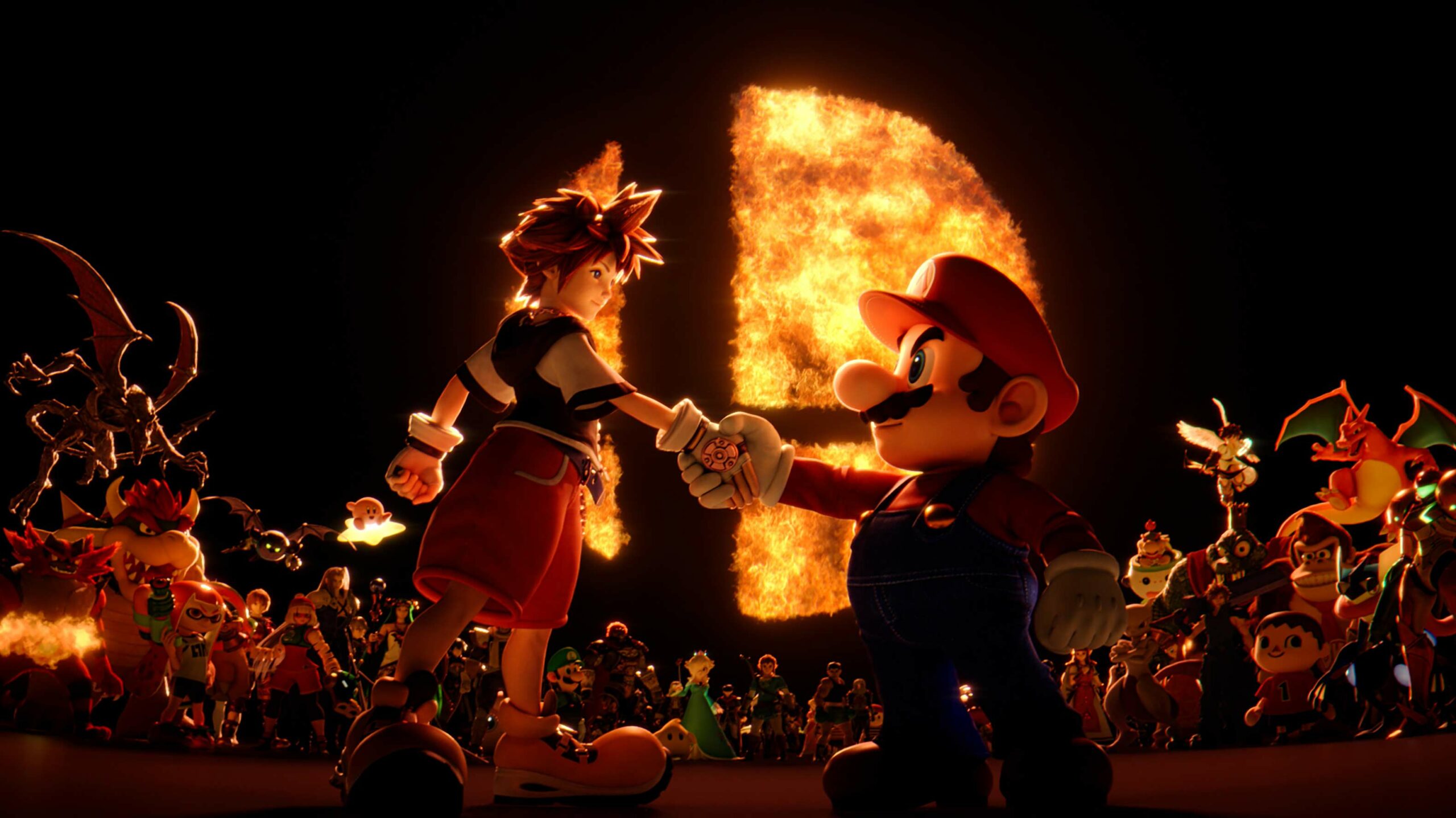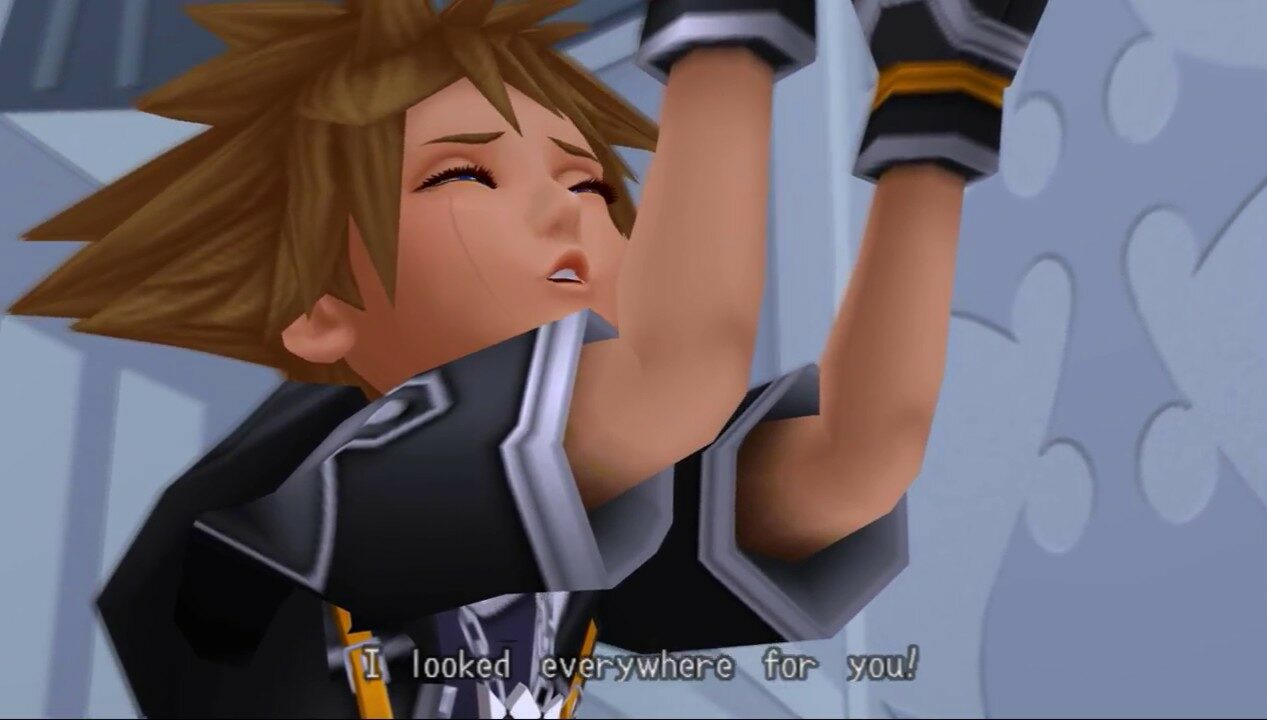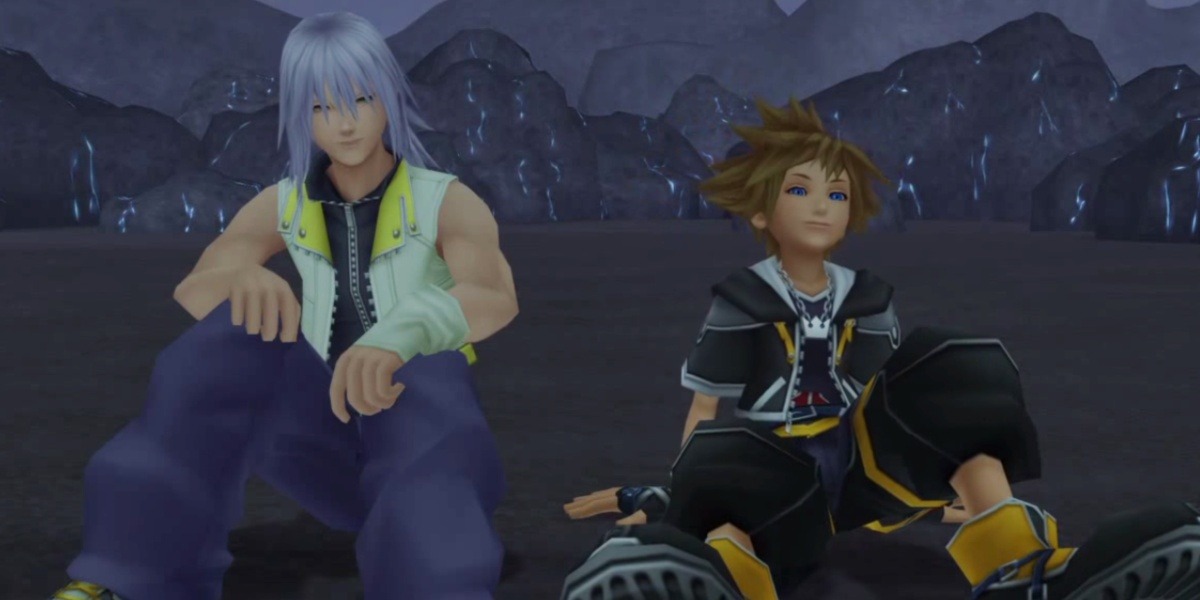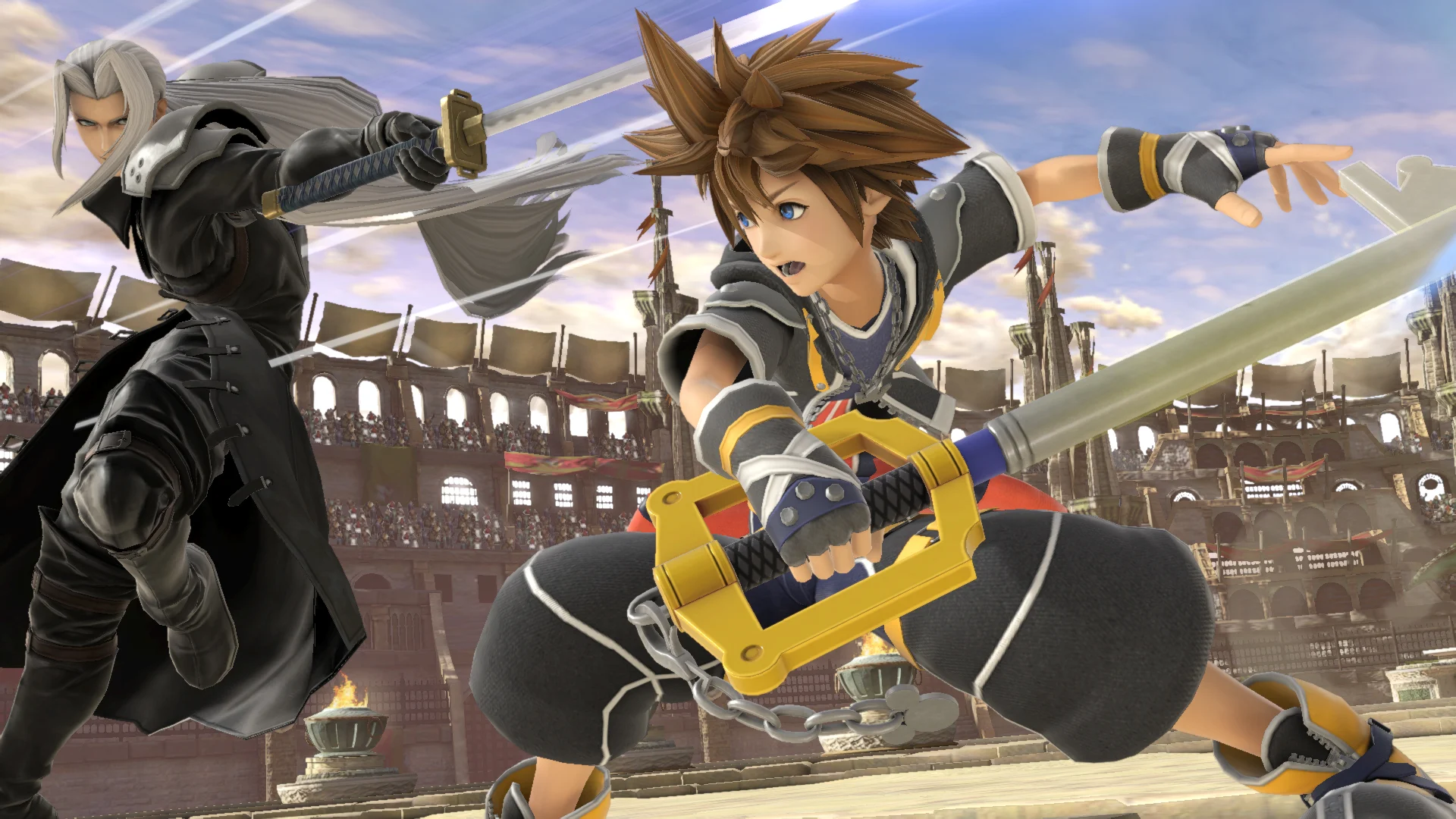
I didn’t think I would be writing another Super Smash Bros. Ultimate-related editorial.
After all, I raved about the entire Nintendo fighting game series’ impact on my life two weeks ago. What else was there to say, really?
But then, Kingdom Hearts‘ Sora was revealed as the final DLC fighter on October 5th. That sweet, goofy, clown shoes-wearing anime boy. By God, they did it: on October 18th, Sora will officially join Smash.
To say that the Sora-focused final ‘Mr. Sakurai Presents’ presentation got me emotional would be an understatement. I lost my goddamn mind, and I’m far from alone in this — just look at the many reaction videos on the web. Ultimate director Masahiro Sakurai has also revealed that Sora was the most requested character in the 2015 ‘Fighter Ballot,’ even above Final Fantasy VII‘s Cloud Strife.
At the same time, I know that a lot of people, including some friends and colleagues, don’t understand what the fuss is about. That’s totally fair. At face value, he’s “just another anime swordfighter,” and one who comes from a decidedly bizarre crossover between Disney and Final Fantasy, to boot.
“That unwavering sense of optimism and willingness to believe in people’s goodness and potential touches you.”
And people, quite understandably, have taken the piss out of Kingdom Hearts for its ridiculously convoluted plot featuring time travel and doppelgängers and multiple dimensions that’s spread across numerous prequels, sequels and spin-offs spanning so many PlayStation and Nintendo systems. It’s an issue I’ve grown increasingly frustrated with, myself.
But for me, Sora in Super Smash Bros. Ultimate is the fulfillment of a dream that I’ve had for well over half my life. From the unrealistic “what if Sora was in Smash?” fantasies in the Melee and Brawl days to the seemingly endless possibilities created by the continuous surprise guest characters of Smash 4 and Ultimate, I’ve held onto the hope that Kingdom Hearts’ plucky hero would join the fight. Even as fans heatedly debated whether it would even happen due to Disney’s ownership of the series, I always believed it could.
The reason for the neverending desire for ‘#Sora4Smash’ is because Kingdom Hearts is just special. At surface level, the colourful and nostalgic Disney worlds featuring many of the original movie actors and the surprisingly deep action-RPG combat is what make the games so entertaining. Further, the fact that Kingdom Hearts introduced me to Final Fantasy, my all-time favourite gaming series, means it’s uniquely dear to me than any other gaming property.
But above all else, Kingdom Hearts has won over me and so many others because of its earnestness. Where the world can often be cynical and cruel, Kingdom Hearts is an unapologetic source of positivity. Some might call it corny, and it’s certainly not always well-written, but it’s unquestionably genuine. Series co-creator and longtime director Tetsuya Nomura gets deserved flack for the Kingdom Hearts‘ now impenetrable lore (and zipper fetish), but I also truly believe he addresses some critical universal themes with the series, especially for youth.
And that all boils down to Sora. All told, he’s not a profoundly deep or dynamic character, but he’s one that’s nonetheless immensely impactful. In a way, Sora is an endearing character for the same reasons that countless people have fallen in love with Ted Lasso. That unwavering sense of optimism and willingness to believe in people’s goodness and potential touches you.
At the start of the series when his childhood home is destroyed, Sora’s main goal is to find friends Riku and Kairi. While he soon finds new friends in Donald and Goofy and doesn’t hesitate to help out their other Disney compatriots, which is inspirational in its own right, Sora’s true desire is simply to reunite with his best buds. That longing is something that connected with me deeply with respect to my childhood best friend Dan*.
I’m a classic example of a son with an alcoholic, emotionally abusive father. What’s more, my (wonderful) single mother worked long hours to support us while my grandparents lived pretty far away. Being an only child also meant that I never had any siblings to bond with, while my many cousins who could have filled that void were in the U.S. Therefore, Dan moving to a distant city when I was 10 was particularly devastating. No longer did we share the same school or live nearby to hang out afterward. Factor in the loneliness I felt with my largely absent family and this distance really hit me hard. At that age, everything feels so much more earth-shatteringly consequential, especially when you feel neglected and alone.
“…It’s uncommon now to see male vulnerability explored in such a way; imagine, then, how rare that was in 2006 when Kingdom Hearts II was released…”
For a long time, this made it difficult for me to reach out to anyone. I became introverted. What if they left, too? But before he left, Dan had also introduced me to KH, which gave my young self something to dive into. I fell in love with the games because they were fun, but I now see that, on some subconscious level, I saw myself reflected in Sora. Not just in his awe at meeting all of the lovable Disney characters I fondly grew up with, but in his unending journey to relocate his friends. And I saw Dan in Riku — the slightly older, taller and more confident friend.
Note: spoilers follow for Kingdom Hearts II’s ending.
That’s a key detail since Kingdom Hearts fans will know that while Kairi is the de facto “love interest” for Sora, Riku is depicted as the actual closest person in his life. Not in a romantic way (though many people certainly “ship” them), but out of pure, platonic love. There’s a well-known scene in Kingdom Hearts II where Sora finally reunites with Kairi and Riku after nearly three full games. Long story short, after being manipulated by the villains Ansem and Maleficent (yes, of Sleeping Beauty fame) into betraying his friends in the first game, Riku is ashamed. By the second game, he’s helping Sora, Donald and Goofy from the shadows, afraid to ever reveal himself to them.
But Sora doesn’t care about any of that. The second he sees Riku, he falls to his knees and starts balling. “I looked everywhere for you!” he cries. “You’re still Riku, no matter what,” he exclaims. In this moment, he’s just overwhelmed to finally have his friend back. Rather than get upset, he chooses to understand and forgive his friend. Riku, in turn, is moved. Looking back on that scene now as an adult, I can see how melodramatic and angsty it is. But I also can now fully appreciate the sincere teachable moments found within. With toxic masculinity abound in today’s society, it’s not that common to see male vulnerability explored in such a way; imagine, then, how rare that was in 2006 when Kingdom Hearts II was released in the West.
As that kid who lacked any other father or brother figure to whom I could express such emotional vulnerability, Dan played this role for me. The infrequent times we got to meet up after he moved felt like miniature recreations of that Sora/Riku scene. No matter what changed between us — him getting a girlfriend, me switching through three schools in three years for the Extended French program — our friendship remained. He was still Dan. And if I missed him dearly, I could say that. Screw what the other kids might have said. Kingdom Hearts taught me it was not only normal, but meaningful, to feel and exhibit all of the emotions that accompany all of this. To try to understand what other people might be going through and cherish the time you have with them.
I don’t think I quite realized the impact Kingdom Hearts had on me until I read this splendid book by former games critic Alexa Ray Correia. She so beautifully articulated what I’d experienced through the series in a way I had never been able to pin down.
“There is no traditional romance in Kingdom Hearts,” writes Corriea. “Rather, we get a picture of intimacy between two young men, two best friends. It’s exceedingly rare that any kind of media portrays non-romantic love between two boys so deeply — too often this kind of bond is dismissed as sexual or nothing at all — but Kingdom Hearts excels at painting that picture.”
Corriea goes on to discuss one of the final scenes of Kingdom Hearts II after Sora and Riku have beaten the villain (in one of my all-time favourite over-the-top series of final boss fights) and saved the day. At this point, many stories would likely lean into a more buddy cop-style celebratory ending between the two friends. Kingdom Hearts II, conversely, sees our heroes stranded and alone on an eerie beach. Before they ultimately escape, they take the time to contemplate the future, like so many kids have done internally, and share what they most admire about one another. Riku envies Sora’s ability to just follow his heart, while Sora confesses that he always sought to be more like Riku. It’s a surprisingly quiet and meditative scene, and it’s stuck with me ever since.
“While Riku and Sora are not in love, the boys’ friendship is one of the deepest and most moving relationships of any kind that I’ve seen in a video game,” explains Corriea. “And part of why it works is because it’s not a romance. Without sexual tension or expressed desire of any kind, these relationships appear as the deepest form of male intimacy: mutual dependence, connectedness, and respect.”
Now, none of this would even work without the incredible music of composer Yoko Shimomura and singer-songwriter Hikaru Utada. When Sora reunites with Riku, you can hear a soft, tender version of Kingdom Hearts’ title music, “Dearly Beloved.” And when Sora and Riku finally leave that beach, their friendship stronger than ever, Utada’s beautiful and rousing Hikari plays. The identity of Kingdom Hearts and all of the emotions it brings out in me is so quintessentially tied to Shimomura and Utada’s themes. There are global Kingdom Hearts concert tours for a reason. I even used to sneak my PSP into my locker against school permission to listen to Shimomura’s music in between classes, so profoundly did it affect me.
And these are just my own personal experiences with Kingdom Hearts. In two separate 2019 pieces to celebrate the long-awaited release of Kingdom Hearts III, Waypoint and Kotaku shared many letters from fans about what the series meant to them. Whether it was those with depression connecting with Riku’s allegorical journey of self-acceptance, trans people finding themselves in the identity struggles of ‘Nobody’ characters like Xion or helping an Acute Respiratory Distress Syndrome (ARDS) patient get through medical treatment, there are so many lovely anecdotes in those features. The series’ unrelenting warmth resonates with so many people for so many different reasons, even to this day.
This brings us back, finally, to Smash Bros. Ultimate. I’ve written about how the game was a great social experience for me throughout my life. But something I realize I didn’t mention in that piece is the deeper significance of the series. The true beauty of Smash is that seeing your favourite characters represented means that all of the special memories you have with them can be carried over and share with others.
“After all these years, the dream has finally been realized.”
Because director Masahiro Sakurai and his team put so much love, heart and care into these fighters, they don’t feel like cheap knock-offs. Between their authentic movesets, music, stages, voices and even sound effects, Smash fighters genuinely remind you of everything you loved about them in their original games.
When I finally get to use Sora in Smash, it won’t just be that I’ll have a fun new sword character to play around with; all of the joy I had with Kingdom Hearts, and what it taught me about friendship and vulnerability, will have accompanied him. Months and even years down the line, I can share this love for Kingdom Hearts with friends and family through Ultimate. The magic of Kingdom Hearts is now part of the magic of Smash, and that will endure for years to come, regardless of where the Kingdom Hearts series itself even goes.
And Sakurai gets this. He knew how much it meant to see the entire icon-filled Smash roster present for Sora’s reveal, all while “Hikari” played triumphantly in the background. He knew how special it was to see Sora finally reunite with Cloud and Sephiroth for both Final Fantasy and Kingdom Hearts fans (and those who are both, like me). And he knew that the final shot — not just for this presentation, but for Ultimate presentations, period — of Sora shaking hands with Mario, the most iconic character in all of gaming, was just such a phenomenal “pinch-me-this-is-so-goddamn-unreal” moment.
Now, you can’t please everyone, of course. There are those who wanted Halo‘s Master Chief, Mario‘s Waluigi, Crash Bandicoot‘s Crash or any number of other characters. That’s completely valid, and I don’t want to take that away from any of you. But hopefully, you can understand why Sora’s inclusion means a lot to so many people, myself included. At the very least, it’s been heartening so far to see a lot of people who have no affinity for Kingdom Hearts, including a few friends, admit that Sora is the perfect final pick because of his massive wide appeal.
Thanks!! pic.twitter.com/xiJdWZKM5P
— 桜井 政博 / Masahiro Sakurai (@Sora_Sakurai) October 5, 2021
And who knows? Maybe the inclusion of Sora, plus all of the Kingdom Hearts games finally coming to Switch, will help introduce a new generation of players who can be touched by the series like us old fans have been for nearly 20 years. I sure hope so. Because the euphoric feeling of having Sora in Smash really is something special. After all these years, the dream has finally been realized. #ThankYouSakurai, indeed.
*I haven’t spoken to him in a bit so I’m not including his real name here out of respect for his privacy.
Image credit: Nintendo
MobileSyrup may earn a commission from purchases made via our links, which helps fund the journalism we provide free on our website. These links do not influence our editorial content. Support us here.





